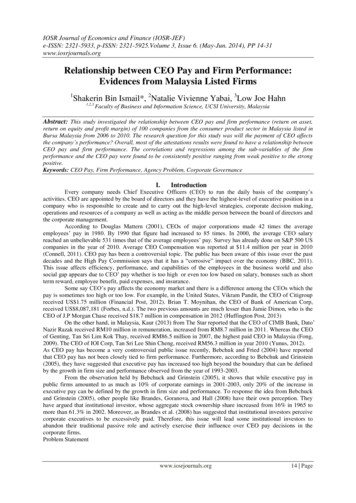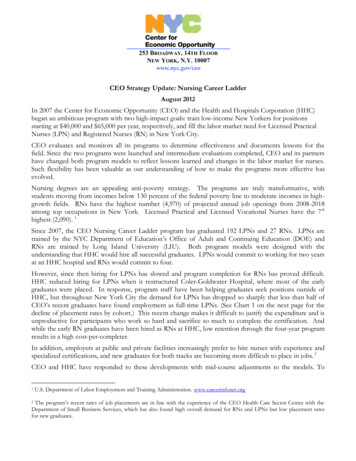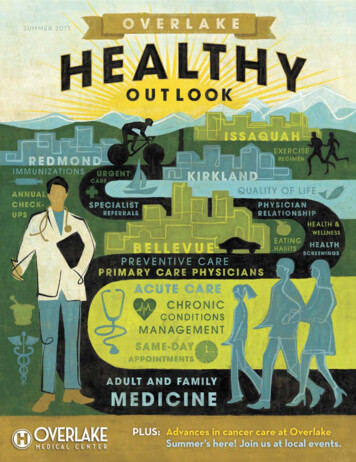
Transcription
From the President & CEOI’m proud to announce we are now live across both thehospital and the clinics with what we are calling ONE(Overlake Network Exchange), the Epic-based electronichealth record. I encourage you to ask your OMC providerabout signing up for ONE Chart. The online system allowsyou to request appointments and prescription refills, viewlab and test results, and ask nonurgent medical questions.This summer is the opening of the David and ShelleyHovind Heart & Vascular Center. The new facility elevatesthe hospital’s level of patient services and brings alltesting and therapeutic services together in one location.The Heart & Vascular Center will include two cardiaccatheterization labs, two electrophysiology labs, a vascularinterventional radiology suite and 15 patient rooms.For the sixth year in a row, Overlake received thePatient Safety Excellence Award from HealthGrades . Theaward ranks us among the top 5 percent of hospitals in thenation for patient safety and one of only two in WesternWashington with the multiyear distinction.As advertised, “We think about you!”Sincerely,Craig HendricksonPresident & CEOH EALTHY OUTLOOK SU M M ER 2013BOARD OF T RUST EE SCecily HallRichard Clarfeld, MDBertrand ValdmanCraig HendricksonJim DoudRobert CampbellPatricia BedientGregory CollinsJanine FlorenceKemper Freeman, Jr.John B. HayhurstBOARD CHAIRIMMEDIATE PAST CHAIRSECRETARYTREASURERTom Miller, MDCHIEF OF STAFFCHIEF OF STAFF ELECTPRESIDENT & CEOASSISTANT SECRETARY2 HEALTHY OUTLOOKDavid HovindLinda MahaffeyDoug MartinLani MobiusNolan NewmanRussell StockdaleThomas Stoll, MDOVERL AKE M EDICAL CENTER1035 116th Ave. NE425-688-5000 Bellevue, WA 98004www.overlakehospital.orgOverlake Hospital Medical Center is a nonprofit, independently operated regional medical centeroffering, in association with medical staff, a wide range of health technologies and specialtyservices. Earnings are devoted exclusively to the continuation and improvement of patient servicesand facilities, as well as educational, outreach and research activities. The information in thispublication is not intended for the purpose of diagnosing or prescribing. If you have concernsabout health issues, contact your personal physician.Periodically, we send communications to friends and neighbors in our community that describe thehealthcare services and products we offer. If you would prefer not to receive communications likethis from our organization, please call 425-467-3548 or email healthyoutlook@overlakehospital.org.Healthy Outlook 2013. Published by the Overlake Marketing Department.Director of Marketing and Public Relations: Kipepeo Brown.Executive Editor: Kelly Blake.Art Director & Photography by Garland Cary.Illustration by Traci Deberko.For an e-copy, visit www.overlakehospital.org/healthyoutlook.
News You C an UseTrying toUnderstand FactorsThat Cause orPrevent CancerThe American Cancer Society (ACS) isinviting men and women between 30 and65 years of age who have no personalhistory of cancer to join a historic researchstudy, Cancer Prevention Study-3 (CPS-3).The purpose of the study is to betterunderstand the lifestyle factors thatcause or prevent cancer and to ultimatelyeliminate cancer as a major health problem.As a partner, Overlake Medical Center willhelp the ACS promote CPS-3 and invitescandidates to enroll on the hospital campuson August 21 and 23.TIPS FOR MAINTAININGPEAK HEALTHRegular preventive care—such as immunizations and breast cancerscreenings—will help you avoid disease and illness.Get ImmunizedWEDNESDAYAugust 21.10 a.m.–1:30 p.mFRIDAYAugust 238 –11:30 a.m.It may be summer, but fall and a new school year will be here before weknow it! Immunizations (or vaccinations) aren’t just for babies and youngkids. We all need shots to protect us from serious diseases and illness.Everyone over age 6 months needs a seasonal flu shot every year.Children under age 6 get a series of shots to protect against measles,polio, chickenpox and hepatitis.Overlake Medical CenterPACCAR Education Center—Insight RoomTo register, go to www.cps3pugetsound.orgPreteens need shots to help protect against tetanus, diphtheria, whoopingcough and meningitis.Adults need a tetanus shot every 10 years. People age 65 need a one-timepneumonia shot.SUMMER 20133
The Doc tor RecommendsADVANCES IN CANCER CARESmarter technology and targeted procedures make treatments gentler on patientsWe may not have cured cancer just yet, but medicine is advancing at a rapid clip, withdoctors offering increasingly better diagnosis and treatment. We asked three physiciansabout the latest advances in cancer treatment at Overlake Medical Center.Q Overlake offers digitaltomosynthesis—or 3-Dmammography—for breastcancer screening. How isthis different from the 2-Dmammograms we’ve been using?A Steven Scallon, MD(diagnostic radiologist): Withdigital tomosynthesis, we’re able to look at individual slicesof breast tissue—like paging through a book—and wecan get rid of the overlapping tissue that can sometimesmimic a mass on the mammogram. One recent studydemonstrated that the combination of a 2-D and 3-Dmammogram picked up 40 percent more invasive cancersthan 2-D mammography alone. So 3-D mammogramsshould help decrease the number of false positives and theunnecessary anxiety caused when patients have to comeback in for something that turns out to be nothing.Q Breast cancer surgery hasbecome less invasive than in yearspast. How do doctors removethe cancer with these smallerprocedures?A Kristi Harrington, PhD(breast surgeon and chair of theBreast Cancer Program): A lotof clinical data supports the idea that breast-conservingsurgery—lumpectomy compared to mastectomy—is just4 HEALTHY OUTLOOKas effective for long-term survival. There’s been a trend, forexample, toward removing fewer lymph nodes to determineif the cancer has spread to the lymph nodes. So if a womanhas early-stage breast cancer and clinically negative lymphnodes, only about two lymph nodes are removed to confirmthat the cancer hasn’t spread into the regional lymphaticsystem. The benefit to patients is that it decreases thechances of lymphedema [localized swelling, most often ofthe arm and hand].Q What are some of the newestradiotherapy treatments forcancer?A William Brent Reece, MD(radiation oncologist): At OverlakeMedical Center, we do everytype of external-beam radiationavailable, including intensitymodulated radiation therapy. Because we’re able to deliverthe radiation directly to the problem area, we can limitdamage to healthy tissue nearby.We also offer three brachytherapy treatments [placingradioactive material in or near the cancerous tissue]. Sorather than getting four to six weeks of external-beamradiation, the patient gets a five-day course with internalbrachytherapy and gets the same result.
NutritionHealthful Potato SaladRETHINKYOUR DRINKSWhat you drink can be as important as what you eat. Studiessuggest calorie intake from beverages has more than doubled sincethe 1960s. So, along with healthier eating and exercise, it’s timeto rethink your drinks. Quench your thirst and maintain energybalance at the same time.Drink plenty of refreshing, calorie-free water.It helps your muscles and brain stay hydratedfor optimal physical and mental performance.Drink nutrient-rich, low-fat milk three timesa day. Dairy helps build and maintain healthybones, teeth and muscle mass.Drink a maximum of 4 to 6 ounces of juice a day.Whole fruits and vegetables are much betterways to get vitamins, minerals and fluids.Drink other beverages with care. Check calories,caffeine, sugar and fat before you drink.Source: Academy of Nutrition and DieteticsIngredients:2 medium potatoes, peeled (if desired) and cutinto 1½-inch cubes (about 2½ cups)½ cup diced sweet onion½ cup diced celery½ small red bell pepper, finely diced¼ cup minced fresh parsley1 teaspoon dried dill weed¼ cup fat-free or low-fat soy-based mayonnaise1 tablespoon seasoned rice vinegar1½ teaspoons mustard⅛ teaspoon salt⅛ teaspoon ground black pepperDirections:Steam the potatoes until just barely tender whenpierced with a knife, about 10 minutes. Do notovercook. Transfer to a large bowl and add theonion, celery, bell pepper, parsley and dill weed.In a separate bowl, combine the mayonnaise,vinegar, mustard, salt and pepper. Mix well. Addto the potato mixture and toss gently until evenlydistributed. Chill thoroughly before serving.Stored in a covered container in the refrigerator,leftover potato salad will keep for up to three days.Recipe from The Cancer Survivor’s Guide.NUTRITION SERVICESYou can learn how to help yourself lead a healthier life throughthe food choices you make. When you see the specialistsin Outpatient Nutrition Services, you can count on soundnutritional guidance.For more information, call 425-688-5484 or SUMMER 20135
WHY HAVINGA PRIMARYCARE DOCTORCOULD ADDYEARS TOYOUR LIFEMatt and Jayme Kennedy enter Overlake MedicalClinics Redmond with their son, Owen.6 HEALTHY OUTLOOK
Your HealthPartnerWhen you’re feeling good, it’s all too easy to skip regular doctor visits and make anappointment only if a problem crops up. But there are good reasons for developingan ongoing relationship with a primary care provider who knows your medicalhistory, can give you regular checkups, and can help you navigate today’s complexhealthcare system. In fact, research shows that people who have a primary caredoctor enjoy better quality of life and more productive longevity.Preventive Care: StayingAhead of the CurveOne reason patients who have a primary care doctorfare better is they get regular preventive care. It’scertainly best—for your health and your wallet—toprevent medical problems or catch them early, beforethey get serious. And research shows that becauseprimary care physicians view a patient holistically,they’re able to provide better preventive care.“Lots of people think preventive care is justtalking about cholesterol and blood pressure, butit also covers a patient’s eating habits, exercisehabits and emotional health,” says Sai PrasannaMannem, MD, an internist at Overlake MedicalClinics Downtown Bellevue. “We look at the overallpicture. The doctor actively asks questions to findthe most suitable preventive care plan for thepatient based on family history and lifestyle.”Your primary care doctor will even take intoaccount other factors, such as work and family,that might affect your health. “There’s pretty gooddata that say there are many illnesses that ariseout of stress,” says Sigrid Barnickel, MD, a familyphysician at Overlake Medical Clinics Issaquah.A primary care physician’s expertise translatesinto concrete benefits. A study conducted byJohns Hopkins University revealed that patientswho receive preventive care from a primary carephysician are less likely to be hospitalized, visitthe emergency room or need surgery. As patientsSUMMER 20137
Primar y C areenter their senior years, they continue to benefit from thatrelationship. One study conducted by the University ofWashington School of Medicine found that people over 65who had a primary care physician were much less likely touse the emergency department for every category of diseaseseverity.Diagnosis: Getting It RightWhen someone experiences a new symptom, it can betempting to hop onto the Internet, self-diagnose andgo straight to a specialist. But while doctors love thatpatients are more informed than ever, many symptoms arecommon to dozens of conditions.“When people have a certain symptom, they tend topigeonhole it to the worst thing they can think of,” saysONE Chart:Your Health Record,at Your FingertipsOn May 1, Overlake Medical Center rolled out asecure, Web-based medical records system calledONE Chart that benefits doctors and patients alike.As a patient, you can use ONE Chart to: View your personal health record. Schedule medical appointments. View your medical history and lab results. Request prescription renewals. Get health maintenance notifications. Ask nonurgent medical questions.To begin using ONE Chart, visitwww.overlakehospital.org/onechart.8 HEALTHY OUTLOOKJames Kriseman, DO, a family physician at OverlakeMedical Clinics Redmond. “But they may be missingthe mark because of other symptoms that might not beevident.”“If you go straight to a specialist, you can miss otherthings that are going on,” says Dr. Mannem. “If you havechest pain, it could be [caused by] anemia or anxiety, andif you just do a cardiac workup, you’ll never find that. It’simportant to start with a primary care doctor who can dothat initial workup and figure out which kind of specialistyou need.”Chronic Conditions: Mapping a PlanResearch shows that primary care doctors provide similarquality care as specialists for certain chronic conditionslike diabetes and hypertension, and can do it lessexpensively. Still, specialists are best qualified to provideadvanced care for patients with complex conditions.If you do need a specialist, your primary care doctor iswell positioned to give you the name of someone who willbe a good fit. “Primary care doctors typically have a longterm relationship with the patient,” says Rick Clarfeld,MD, medical director of Overlake Medical Clinics andchief of staff elect at Overlake Medical Center. “They getto know their patients and understand what their goalsare, how they solve problems and their communicationstyle. So when a patient develops a problem, they’d be thebest person to pick a specialist for them.”As you begin seeing a specialist, your primary caredoctor plays the important role of keeping an eye on thebig picture. “Your primary care doctor is the hub—theperson who coordinates your care,” says Val Chrusciel,director of Overlake Medical Clinics.Having someone to coordinate your care becomes evenmore important if you’re seeing more than one specialist.“I have patients with complex health problems, so I mightcoordinate between orthopedics and vascular surgeons
S lug H ereand infection [doctors],” says Dr. Barnickel.“Sometimes you have recommendations from onedoctor to take a certain medication, and another doctormight recommend something else [that might interact withthat medication],” Dr. Mannem says. “Your primary caredoctor can help decide what is most appropriate.”Continuity: Closing the CircleNo patient should ever slip through the cracks, soOverlake’s community of primary care doctors iscommitted to accountable care every step of the way.“Accountable care is managing the health of a person overthe different transitions of care—inpatient to outpatient,”Chrusciel says. “If someone has been to the emergencyroom or has been hospitalized, we make sure we’refollowing up with them when they get discharged, andthat’s where primary care really comes into play. If youget discharged and you’re struggling at home, you mightend up back in the emergency room or the hospital. Soit’s important to have that visit with your primary carephysician to make sure you understand what you needto do next and to reconcile your medications.”Of course, just visiting a primary care doctor isn’tenough. It’s important for patients to be open, so finding adoctor with whom you’re comfortable is key. “It’s importantfor patients to talk about their gender and social, mentaland emotional health, because that helps us understandtheir physical symptoms,” Dr. Mannem says. “I alwayssay there should be nothing you should hide from yourdoctor—even small things.”If you don’t have a primary care doctor, please makean appointment today. As Dr. Clarfeld says, “Primary careis the backbone of our health system. As we look to thefuture, we’re trying to focus on keeping people healthy,and that starts with your primary care doctor.”What kind of primary caredoctor do I need?Most people: Family practice doctorPeople with significant medical conditions: InternistTo find a primary care physician at Overlake, visitwww.overlakehospital.org/find-a-doctor or call Overlake’sphysician referral line at 425-688-5211.SUMMER 20139
Foundation & AuxiliariesTOUCHING LIVES,MAKING A DIFFERENCEA dedicated supporter of Overlake, Brittany Barkeris passionate about giving back.When she was asked to co-chair the BandageBall, it didn’t take her long to jump in with bothfeet. “I didn’t know much about organizing anevent,” she says, “but I knew I loved Overlake.”Barker was already a member of Pulse! forOverlake, a peer network dedicated to seeingthe hospital thrive as the region’s premiermedical center. She lights up when she talksabout her experience with Overlake. “If you findBrittany Barkeran organization you’re passionate about, that’smeaningful to you, it becomes part of who you are and you want to see it succeed.”Barker has strong roots in the community. Her grandfather, Vern Fortin, was oneof a small group of Eastside business leaders who helped found Overlake in 1960. Hebelieved the community deserved to have a world-class hospital. Today her mother,Janine Florence, carries on this commitment as an Overlake trustee. “My grandfatherinstilled in us how important it is to be involved and give back to your community,”Barker remembers. “He got real joy from giving, from making a difference, and taught usthat however small the contribution, if it’s significant to you, it’s significant to the personwho receives it. That really stuck with my family.”Barker feels reassured to have exceptional quality healthcare so close by and believesthat it’s important for people to get involved. “So many people don’t know Overlake is anonprofit hospital that isn’t receiving tax dollars, and that it needs our support.” She thinksit’s especially important for her generation. “It’s essential Overlake be here for another 50years, and it’s going to take my generation’s support to make that happen.”Support forPalliative CareIf you’ve ever experienced the longterm illness or death of a loved one,you know the needs of patientsand families go well beyondclinical care. The Palliative CareProgram at Overlake supports andcomforts people through the mostvulnerable times in their lives.To ensure Overlake patientsand families continue to haveaccess to these vital services, theOverlake Foundation establishedthe Palliative Care AdvancementFund. Contributions will helpOverlake provide pain andsymptom management; coordinatecare; and offer emotional, socialand spiritual support.Overlake is distinguishedby its culture of caring. Donorsupport was pivotal in creating thisprogram, and gifts to the PalliativeCare Advancement Fund will helpit continue to make a deep andmeaningful impact on patients andfamilies. To make a donation, visitwww.overlakehospital.org/donate.Learn More About Giving and Volunteeringwww.overlakehospital.org/supporte: foundation@overlakehospital.orge: auxiliaries@overlakehospital.org10 HEALTHY OUTLOOKOverlake Medical CenterFoundation & Auxiliaries1035 116th Ave. NEBellevue, WA 98004Foundation: 425-688-5525Auxiliaries: 425-688-5529
S enior S er vicesSEEING CLEARLYThe latest in the causes, prevention and treatmentof cataractsOur sight is one of our most valued senses, enabling usto enjoy the beauty in life. But often as we age, manyof us suffer from cataracts—which are a cloudinessthat develops in the normally clear lens of the eye. For thosewho have cataracts, seeing through cloudy lenses is like lookingthrough a foggy window.Cataracts typically develop over time as you age, withmore than half of people over the age of 65 affected. Heredityplays a role in cataracts’ development, just as it determineswhen hair begins to turn gray. A serious injury can cause atraumatic cataract to develop. Besides injuries, other factors cancontribute to earlier-than-normal cataract development. Thefactors include exposure to ultraviolet rays, harmful chemicalsor radiation; use of some medications; and disease or infectionprior to birth. It is even possible to have congenital or juvenilecataracts.Signs and symptoms of cataracts include: Clouded, blurred or dim vision. Increasing difficulty with vision at night. Sensitivity to light and glare. Seeing “halos” around lights. Frequent changes in eyeglass or contact lens prescription. Fading or yellowing of colors. Double vision in a single eye.Today, new surgical technologies and anesthesia allow cataractsurgery to be done on a low-stress, outpatient basis, lettingpatients return home shortly after the procedure. Modernmicrosurgical techniques also allow patients to enjoy good, clearvision after cataract removal. In fact, many patients see as wellif not better than ever before. Thanks to advances in surgicalprocedures, vision decline from cataracts can be viewed as anopportunity to turn the clock back to better vision than you mayhave had for decades.Talk to your primary care physician for a referral.How to MaintainGood Eye HealthEat for good vision: Nutrients may help ward offage-related vision problems.Quit smoking: Smoking increases your chances ofgetting cataracts, optic nerve damage and maculardegeneration.Wear sunglasses: The right kind of sunglasses willprotect your eyes from the sun’s ultraviolet (UV) rays.Use safety eyewear: Protect your eyes whileworking with hazardous or airborne materials, orplaying sports like hockey, racquet ball and lacrosse.Look away from the computer: Rest your eyes every20 minutes by looking 20 feet away for 20 seconds.Take a 15-minute break every two hours.Visit your eye doctor regularly: It helps youprotect your eyesight and make sure you are seeingyour best.SUMMER 201311
Classes and ProgramsClasses are offered at multiple locations. Check your confirmationletter for more details. Preregistration required.TWO EASY OPTIONS FOR REGISTRATION:1. Go to www.overlakehospital.org/classes.2. Call 425-688-5259, Monday–Friday, 8 a.m.–4:30 p.m.Many of our programs and classes are supported by ourOverlake Medical Center Auxiliaries.Become a fan of Overlake and follow us online.PLANNING FOR PREGNANCYAn evening of information for prospective andnewly expectant parents. Experts discussmaternal health, prenatal screenings, andchanges in the family budget. Refreshments served.Preregistration required. Check our website forour September class. 5:30–8:30 p.m. FREE.FREE Weekly E-mailA great resource to guide expectant parentsthrough pregnancy and the first year of their baby’slife, with customized information and resourcesfrom Overlake’s parent education staff. Visitoverlakehospital.org/childbirthcenter to sign up.Childbirth Center ToursSign up at www.overlakehospital.org/classes.Before Baby ComesPreparation for labor, birth and life with yournewborn. Visit www.overlakehospital.org/classesfor class descriptions, dates and times. Registerin your first trimester for best selection.Classes on Childbirth and Newborn Careww Preparation for Childbirth and Newborn Care.ww Breastfeeding: essential information.ww Prenatal Yoga: for expectant and postpartummoms.ww Online Childbirth Preparation.ww Car Safe Kids: how to choose and install aninfant car seat.ww Conscious Fathering: for expectant dads.Celebrate the special relationship betweenfather and child.PARENTINGCar Seat CheckAttend a one-on-one consultation with an expertto learn correct car seat installation and usage.3rd Thu. of the month, 4–6 p.m. at Barrier Audi,1533 120th Ave NE, Bellevue. Reserve your spotby calling Barrier Audi at 425-643-3000. Space islimited. Preregistration required. FREE.For Girls Only: A Heart-to-Heart Talkon Growing UpandFor Boys Only: The Joys and Challengesof Growing UpBellevue classes are sponsored by SeattleChildren’s Hospital and Overlake. Each of theseprograms is offered as a two-part class from6–7:30 p.m. and is recommended for girls or boysages 10 to 12 years and a parent or guardian. Everyfamily will receive the book Will Puberty Last MyWhole Life? Registration and more informationare available at www.seattlechildrens.org/classes.Register early for best selection. Scholarshipsavailable. 70 per child/parent; 20 per additionalperson.SAFETYBetter BabysittersSponsored by Seattle Children’s Hospital andOverlake. Youth ages 11 to 14 years of age willlearn responsible babysitting by studying basicchild development, infant care, safety, how tohandle emergencies, age-appropriate toys,business tips and what parents expect. Classesare held regularly on Saturdays and Sundaysfrom 9 a.m.–2 p.m. at Overlake in Bellevueand Seattle Children’s Hospital in Seattle. Aclass schedule and registration are available atwww.seattlechildrens.org/classes-community. 40 per person.First Aid and CPR Certification ClassIncludes infant/child/adult CPR, automatedexternal defibrillators (AEDs) and basic first aidtraining with an emphasis on childhood-relatedinjuries. Receive a two-year American HeartAssociation completion card and workbook.These classes are recommended for everybodyincluding day care workers and others needingcertification for their workplace. First aid andCPR/AED portions may be taken separatelyfor 40 per class. Mon., Aug. 5 and Wed.,Aug. 7, 6:30–9:30 p.m. or Sat., Sep. 21,9 a.m.–4 p.m. 70.Infant Safety-Proofing and CPRCompletion cards are not awarded in this class.Weeknights, Aug. 14 or Sep. 24, 6:30–9:30 p.m.;Sat., July 20 or Sep. 14, 9 a.m.–noon. 35 perperson; 60 per couple.CPR for Healthcare ProvidersWed., July 10 or Sep. 18, 6–9:30 p.m. 60.For more information about our classes, or to register,12 HEALTHY OUTLOOK
.HEALTHYLIFESTYLESMotion Is LifeIs pain keeping you from enjoying life? Ifso, attend this informative seminar, taughtby an Overlake orthopedic surgeon, tolearn more about joint pain relief as well asknee and hip replacement. Our presentersinclude surgeons James Bruckner, JonahHulst and Steven Ratcliffe. Time allowed forquestions. Tue., Aug. 13 or Wed., Sept. 11,6:30–8 p.m., at Overlake Medical Center inBellevue. Preregistration required. FREE.Hypnosis for Weight LossGive your subconscious mind a map that tells itwhere you want to go. In this three-part series,Robert W. Felix, certified hypnotherapist, willhelp you visualize your ideal body size and shapethrough hypnosis to achieve the results youdesire. Thu., July 11, 18 and 25 or Sep. 12, 19 and26, 7–9 p.m. 89. Reduced rates are available forthose who have previously taken an Overlakehypnosis class. Check our website for details.Weight Loss Surgery SeminarsLearn about weight loss surgery to see if it’s rightfor you. For information, check our website orcall 425-688-5214. Preregistration is required.FREE. July 2, 25, 30, Aug. 13, 20, 22 and Sep. 3,17, 26.DIABETES EDUCATION SERVICESDiabetes Education ServicesOverlake’s Diabetes Education Services offersone-on-one education as well as a three-partseries of classes to help you learn practicalskills to manage your diabetes. To schedule anappointment or to register, call 425-688-5700and press 5 when prompted.Is Your Blood Sugar Rising?Learn to manage your blood sugars and risk forType 2 diabetes. This one-time, 90-minute classdoes not require a physician referral. For moreinformation and to register, call 425-688-5636.Overlake Outpatient Center, 1120 112th Ave. NE,Suite 150, Bellevue. 40 (prepaid at registration).Diabetes EducationA series of three classes that build on each other.Education includes discussion of medications,meal planning and making food choices to fit yourlifestyle, how to avoid complications of diabetes,guidelines for monitoring your blood sugar athome and more. Requires a physician’s referral.Call 425-688-5700 to register. We recommendcontacting your insurance company in advanceto confirm coverage.SENIOR CLASSESA Matter of BalanceA Matter of Balance can help seniors improvetheir quality of life and remain independent.The class is designed to reduce the fear offalling and increase activity levels. Tue. and Thu.,Sep. 3–26, 10 a.m.–noon. The Gardens at TownSquare, Bellevue. Preregistration required; call425-688-5259. Includes workbook and waterbottle. Complimentary lunch following firstsession and FREE parking. FREE.(Seated) Yoga for BalanceThis breath-oriented practice will help increaseyour circulation, release tense muscles andstrengthen core muscles while promoting betterposture and balance. Exercises are done froma chair and adapted to each individual’s ability.Ridgewood, 150 120th Ave. NE, Bldg. F, Bellevue.Tue., July 9–30, or Aug. 6–27, or Sep. 3–24, orThu., July 11–Aug. 1, or Aug. 8–29, or Sep. 5–26;11 a.m.–12:15 p.m. Preregistration required; call425-688-5259. 44 for four-week session.Early Stage Memory Loss ProgramOpen to those recently diagnosed with dementiaand their loved ones. The program provideseducation and supportive discussion onmedical causes, treatments, future planning andcommunication strategies. Ridgewood, 150 120thAve. NE, Bldg. F, Bellevue. Thu., Sep. 19, 1–4 p.m.Preregistration required; call Liz at Alzheimer’sAssociation at 206-363-5500, ext. 229. FREE.Understanding DementiaThis class will provide a brief review of the basicinformation relating to dementia. What arenormal and abnormal memory changes with aging,risk factors, and what to do if you suspect a lovedone has a memory problem. Not appropriatefor the memory-impaired person. Presented bythe Alzheimer’s Association. Bellevue FamilyYMCA, Bellevue. Thu., Sep. 12, 2–3:30 p.m.Preregistration required; call 425-688-5259.FREE.Communicating With Someone With DementiaThis class will provide families and caregiverswith some practical hands-on-tools. Goodcommunication can improve quality of life forpeople with dementia and their families and canhelp prevent resistance and difficult behaviors.Not appropriate for the memory-impairedperson. Presented by the Alzheimer’sAssociation. Bellevue Family YMCA, Bellevue.Thu., Sep. 26, 2–3:30 p.m. Preregistrationrequired; call 425-688-5259. FREEperson with dementia to better understand themeaning of behaviors and uncover their triggers,as well as to intervene to decrease the distressand prevent/defuse inappropriate behaviors.Not appropriate for the memory-impair
HEALTHY OUTLOOK SUMMER 2013 OVERLAKE MEDICAL CENTER 1035 116th Ave. NE Bellevue, WA 98004 425-688-5000 www.overlakehospital.org I'm proud to announce we are now live across both the hospital and the clinics with what we are calling ONE (Overlake Network Exchange), the Epic-based electronic health record.




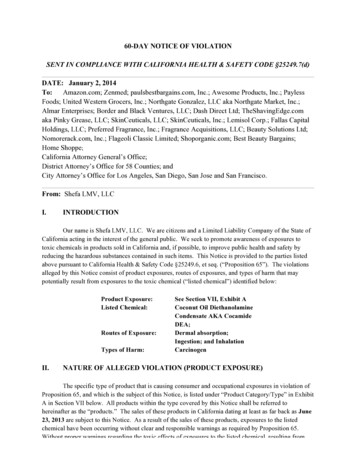
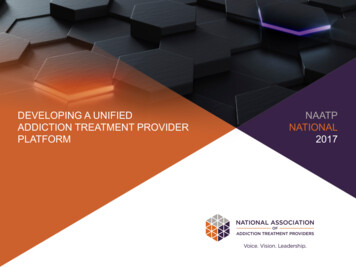

![WELCOME [ montclair.edu]](/img/31/commencement-program-2022.jpg)


